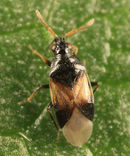Neotropical Entomology (2018) 47, 161-170
From Pestinfo-Wiki
 | Selected publication you are invited to contribute to the discussion section (above tab) |
Problems inherent to augmentation of natural enemies in open agriculture
Neotropical Entomology 47 (2), 161-170
Abstract: Augmentation biological control has successfully replaced a lot of insecticide use in 'closed system' agriculture (e.g., greenhouses). The profitable commercialization of biocontrol agents in greenhouses has created an incentive to expand markets for mass-reared beneficial insects into open agricultural systems, often without sufficient scientific justification. However, the semi-contained nature of greenhouse culture is often critical to the success of augmentation and can serve to mask potential pitfalls and intrinsic limitations of this approach in open systems. Factors contributing to greenhouse successes include the reduced biological diversity of contained agroecosystems, the prevention of agent dispersal, the ability to maintain environmental conditions within a range favorable for the agent, the exclusion of competitors and natural enemies of the agent that might otherwise diminish its efficacy, and the absence of alternative prey/hosts that could divert predation/parasitism from the target pest. There are also problems arising from collection of source material from locally adapted populations, and the inadvertent imposition of artificial selection in the course of laboratory rearing. Besides highlighting these pitfalls, this paper aims to encourage more consideration of conservation approaches prior to investment in augmentation programs which entice farmers into perpetual cycles of 'rear and release.' I argue that although augmentation can benefit agriculture whenever it replaces pesticide applications, it does not constitute an ecologically sustainable solution because it requires continued inputs, and it can distract research attention away from more sustainable objectives. Sustainable biological control is best achieved through modifications to cultural practices that increasingly 'naturalize' agroecosystems, thus facilitating the natural recruitment and persistence of beneficial arthropod fauna, combined with habitat management geared to increasing overall plant and arthropod diversity in the agroecosystem.
(The abstract is excluded from the Creative Commons licence and has been copied with permission by the publisher.)
Link to article at publishers website
Database assignments for author(s): J.P. Michaud
Research topic(s) for pests/diseases/weeds:
biocontrol - natural enemies
Research topic(s) for beneficials or antagonists:
inundative/inoculative release
Pest and/or beneficial records:
| Beneficial | Pest/Disease/Weed | Crop/Product | Country | Quarant. |
|---|